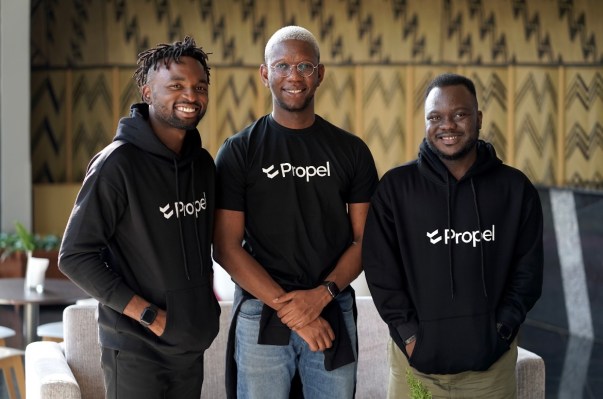Besides the billions of dollars from local and foreign investors, a strong factor behind Africa’s growing tech ecosystem is its burgeoning talent. Being sought after locally and internationally, these homegrown talents — including software developers who, according to Google’s Africa Developer Report, grew almost 4% to 716,000, UI/UX designers, engineers and other tech professionals — have given rise to several talent-matching platforms across the continent, including unicorn Andela, GOMYCODE, AltSchool, Decagon among others.
In the latest development, Propel, a Lagos- and Berlin-based startup that wants to build sustainable talent pipelines for communities and help global companies derisk the process of hiring remote talent from emerging markets, particularly in Africa, has secured €2.5 million (~$2.74 million) in seed investment.
The round was led by Amsterdam-based No Such Ventures, with participation from APX (an accelerator by Axel Springer Digital Ventures and Porsche Digital), Golden Egg Check and Future of Learning Fund. The startup, founded in 2020 by Sunkanmi Ola, Seun Owolabi and Abel Agoi, intends to use the investment to drive the roll-out and adoption of its community-as-a-service platform and drive €1 million in revenue generated for communities by Q4 next year.
Over the past three years, a common trope has been that the pandemic spurred global remote work and increased hiring of local talent by multinational companies, mostly looking to reduce hiring costs. And despite a major reset since mid-2022 that has seen tech companies lay off more than 200,000 employees and a push for partial to full return-to-office requests by employers, the importance of open talent economy will remain, especially in Europe, where the population is aging, thereby leaving a gaping hole that realistically needs remote talent outside the region.
Africa has the youngest population globally and its tech talent pool is bound to widen, aided by the proliferation of online learning, STEM courses and, most importantly, communities, which play an important role in placement and an area of focus for Propel. A year into placing local tech talent in retail and automotive companies like Porsche and Mercedes, Propel noticed that these talent were connected to a community such as developer groups, talent incubators and training schools, slightly changing the startup’s focus (according to the startup, 8 out of 10 people in emerging markets belong to a community.) Hence, its community-centered approach.
“We realized communities are the building blocks of any tech ecosystem, particularly emerging market ecosystems, but nobody has been building for communities and the distribution layer for the tech talent pipeline had been missing,” said Ola, the chief executive officer at Propel. “Most tech communities build their pool and upskill, but the last mile where you convert these talents to jobs is missing and communities struggle in that regard.”
Propel provides a pipeline for talent in these tech communities, connecting them with a network of companies driven by diversity, equity and inclusion (DEI) mandates and specific job roles that need to be filled. In exchange for providing last-mile infrastructure, Propel plugs into the diverse pools of talent within these tech communities spanning multiple skill sets from software development to design, data science to no-code and other digital transformation skills.
This pipeline is offered to global companies, such as in what it calls a “community-as-a-service” model. Propel has worked with companies like the aforementioned and Orange Telecoms, Stepstone and a roster of startups and scaleups across Europe for various purposes, including hiring talent, co-creating community hackathons and designing DEI initiatives, to name a few.
Ola said in addition to access to work, tech talent from these communities can access benefits (by partnering with service providers) from healthcare and workstation access and, much later, financial services, including loans and asset financing.
The two-year-old talent matching firm offers this “value stack” as an all-in-one platform to over 100+ tech communities varying in location, gender distribution and tech stack across 15 African countries. Some include SheCodeAfrica, Ingressive for Good, Niyo Network, Datafest, People In Product, Friends of Figma and various Google Developer Groups, with an ecosystem size of just under 400,000 members. Ola said the company’s goal is to grow to 500 communities with 1 million members across the board in 2024 — and generate millions in revenue for these communities through commissions from jobs, perks and finance on the platform.
Propel makes revenue from hiring and placement fees and rebates; Ola said the community also receives a fraction of these fees. “If a community member gets placed, the community gets a bit of that revenue to add to their coffers. So we’re also creating new financial revenue streams for communities that did not exist before, where they always have to depend on just grants or sponsorships. We’re supercharging communities and we’re providing rockets for them to be able to grow to the next level,” the CEO noted.
The 25-person team, distributed across Amsterdam, Berlin, Johannesburg, Lagos, London and Nairobi, has placed more than 550 people into job roles across multiple countries. To date, the company, backed by Google Black Founders in Europe and raised over €3 million, will look to scale its community platform, launch new client offerings and deepen its ecosystem of communities going forward. Sophie Heijenberg, an investor at No Such Ventures, speaking on the investment, said, “Propel’s unique, community-focused approach to driving the open talent economy sets them apart and is a solid addition to the Future of Work category. We’re bullish about their roadmap and super-excited to partner with them on this growth journey.”
